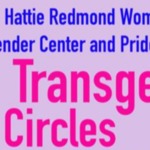Interviewer: Group Story Circle format
Interview Date: May 31, 2023
Location: Hattie Redmond Women and Gender Center, Oregon State University
Duration: 1:38:25
In this story circle, participants take turns sharing their stories regarding the topic of preserving stories, resources, and ongoing legacies. They start the story circle with a Land Acknowledgment and Black Lives Matter statement. They then do introductions and answer an icebreaker question: if you were famous, what would you be famous for? After that, Quincy Meyers (ze/hir/hirs), one of the co-facilitators, shares the prompt and they begin the circle by each sharing their ideas from the prompt, and then others responding before moving to the next person. Some of the key ideas they touch on in relation to the prompt include physical and online communities and networks, online ownership, history and modern day parallels, the Pride Center staff, and representation.
After some brief technical issues, they continue the conversation with reminiscing about people who have moved on or they are no longer in contact with and how their legacies still live on within the community, and about choosing resistance versus safety, in terms of safe states to be in. Some of the participants work with children, so the participants discuss ideas such as what you want to pass down to trans kids right now, exploration and education for children, not needing a further explanation than “because I like it,” queer existence as disruption, and being someone who sparks conversations for others. The participants also discuss what helped them realize their identity, which includes discussions about seeing representation in normal life, the effects of having queer family members, and gendered clothing and exploration as kids. The conversation also explores ideas such as experimental genders, experiences with autism and gender, and identity politics. The conversation concludes with a discussion on institutional memory at OSU and being a part of that.
Dublin Core
Title
Description
After some brief technical issues, they continue the conversation with reminiscing about people who have moved on or they are no longer in contact with and how their legacies still live on within the community, and about choosing resistance versus safety, in terms of safe states to be in. Some of the participants work with children, so the participants discuss ideas such as what you want to pass down to trans kids right now, exploration and education for children, not needing a further explanation than “because I like it,” queer existence as disruption, and being someone who sparks conversations for others. The participants also discuss what helped them realize their identity, which includes discussions about seeing representation in normal life, the effects of having queer family members, and gendered clothing and exploration as kids. The conversation also explores ideas such as experimental genders, experiences with autism and gender, and identity politics. The conversation concludes with a discussion on institutional memory at OSU and being a part of that.

